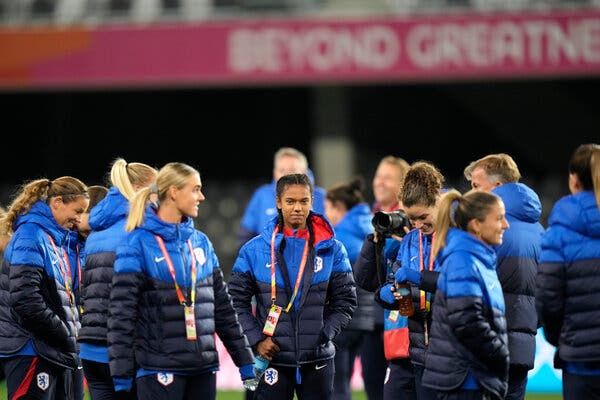The Netherlands, Sweden and France are the teams to watch on Sunday, the fourth day of the Women’s World Cup. Sweden, the world’s third-ranked team and a semifinalist at last year’s European Champion, are a regular contender at major tournaments. The Dutch were the runners-up at the 2019 World Cup, and they still have many of their core players from that tournament on their roster. The French have a new coach but are familiar faces in late stages of international tournaments.
Sweden vs. South Africa
Never count out Sweden.
The Swedes reached the semifinals of the European Championship last year only to lose to England, the eventual champion. A year before they that, they won the silver medal at the Tokyo Olympics. That came after a run to the semifinals at the World Cup in France, and a trip to the final of the Olympic tournament in Rio de Janeiro in 2016, when Sweden stunned the United States in the quarterfinals.
Long story short, Sweden comes to play.
Desiree Ellis has coached South Africa’s national team back from obscurity, leading it to an Africa Cup of Nations title in 2022, its first victory in that continental championship. She also coached the team to its first World Cup berth in 2019. South Africa did not win a single game and failed to advance past the group stage, however, and it faces a tall task against Sweden today.
Netherlands vs. Portugal
The Netherlands have been a force in international soccer for several years. It won the 2017 European Championship, reached the World Cup final in 2019 and took the United States to a penalty shootout in the quarterfinals of the Tokyo Olympics in 2021.
Its first opponent in this World Cup is Portugal, which needed 13 qualification games to clinch its spot in the 32-team field, the most of any team competing. Portugal is one of the eight teams appearing in the Women’s World Cup for the first time.
That experience gap favors the Netherlands, but of course the matchup’s placement in Group E — with the United States — puts heavier pressure on both teams to post an early win if they want to make it to the knockout rounds.
The Dutch, who lost to the Americans in that World Cup final four years ago. will face the U.S. again on Thursday in Wellington, New Zealand (Wednesday night Eastern time). The game is one of the most highly anticipated matchups of the group stage, and the winner will face a far easier path in the knockout rounds. But first things first, and that’s Portugal.
France vs. Jamaica
Despite a successful run in international play over the past few years, France has been in turmoil behind the scenes. In March, the French federation fired its longtime coach, Corinne Diacre, after players complained of an unhealthy environment on the team.
Hervé Renard, a well-traveled coach but one who had never led a women’s team, has worked to steady the ship. But if his pedigree coaching women is thin, his World Cup pedigree is long: Most recently, he coached Saudi Arabia in the men’s World Cup in December, a run that included a famous win over Lionel Messi and Argentina.
France lost a disappointing semifinal to Germany in the 2022 European Championship and failed to qualify for the 2021 Tokyo Olympics. After what they have been through, a win in the first game in Australia could help stabilize the team — and set it on the path for a deep run.
Standing in the way is Jamaica, a team playing in its second World Cup. Jamaica had to use crowdfunding websites to raise money for the team’s trip to Australia and New Zealand. The Jamaicans lost all three of their games in the group stage in 2019.

France arrived in Australia as a World Cup favorite on the mend. Torn apart by bitter feuds, it has in recent months lost players, welcomed them back, and then lost them again. It has changed coaches, changed approaches and changed tactics. And now it has asked Hervé Renard, a respected 54-year-old with a decorated men’s World Cup résumé but no previous experience coaching women, to carry it at least as far as the semifinals.
He started the process, he said, by being open about what he did not know.
“For me everything was new because I didn’t know women’s football, how to manage the girls,” he said. “I was lucky because on our staff a lot of people were already working with women’s football. So I was listening.”


